#Black Studies Matters
Text
Yahoo News: Civil Rights Groups Horrified at Elon Musk's Racist Outburst Against Black People
Earlier this week, multi-hyphenate billionaire Elon Musk endorsed a tweet suggesting Black students at Historically Black Colleges and Universities (HBCUs) have lower IQs and shouldn't become pilots.
"It will take an airplane crashing and killing hundreds of people for them to change this crazy policy of DIE," he tweeted, intentionally mixing up the letters of the acronym for "diversity, equity, and inclusion."
Civil rights groups were understandably horrified at the billionaire's racist comments.
"The only thing anyone needs to hear from Musk about diversity in the workplace is an apology," Marc Morial, president and CEO of the National Urban League, told NBC News, calling his statements "abhorrent and pathetic."
In his tweets, Musk appeared to imply that HBCU students shouldn't be allowed to become pilots. However, neither his statement nor the tweet he was responding to stand up to virtually any degree of scrutiny, from made-up average IQ numbers to wrongfully correlating high SAT scores with high IQ.
Musk also claimed that a United Airlines program that allows students at three HBCUs to interview to become a pilot meant that the airline had "prioritized DEI hiring" over "safety," a demonstratively false statement that only further highlights his twisted worldview.
Even fellow billionaire Mark Cuban saw through the racist fearmongering.
"BTW, looks like multiple layers of merit-based evaluations before they can fly for United," Cuban tweeted, adding a link to the program.
In a schoolyard bully-esque response, a clearly incensed Musk called him "a liar" — without offering any evidence, of course.
In the CEO's mind, DEI initiatives seem to lead to mistakes like the door plug of a Boeing 737 MAX 9 jet falling out and forcing an emergency landing — a preposterous claim with no relationship to reality.
To be clear, Musk's latest hurtful remarks shouldn't come as much of a surprise, given previous comments and conspiracy theories he's already endorsed.
Musk's ventures also happen to have a well-documented problem with overt racism in the workplace, with swastikas and nooses found at Tesla, according to a lawsuit filed by the US Equal Employment Opportunity Commission (EEOC) last year.
"Musk’s company not only refused to investigate complaints or take any steps to end the abuse, it viciously retaliated against employees who complained or opposed the abuse," Morial told NBC.
It's a sad state of affairs, with Musk's racist tirades quickly becoming a common fixture on his social media platform X. Just over a month ago, Musk called an unhinged and antisemitic conspiracy theory "the actual truth," leading to an outpouring of criticism and condemnation.
His latest remarks are only adding to the pile.
"Reminder to Elon Musk: providing a home for the proliferation of hate speech and white supremacist conspiracy theories kills people," NAACP President and CEO Derrick Johnson wrote in response to one of Musk's tweets. "Diversity, Equity, and Inclusion cultivates a more inclusive society."
"They are not the same," he added. "We are not the same."
Yet Musk is digging in his heels. In response to NBC's reporting, Musk lashed out once more.
"Those are openly racist organizations," he tweeted in a pitiful rebuke that will likely only stoke the flames.
More on Musk's overt racism: Elon Musk Cosigns Racist Claim That Black Students Have Low IQs
#Civil Rights Groups Horrified at Elon Musk's Racist Outburst Against Black People#elon musk#musty#dumb as a rock on mars#elon white savior musk#white supremacy#white hate#white ignorance#racists#Black Lives Matter#Black Learning Matters#Black Studies Matters#DEI#White Lies#White Liars
18 notes
·
View notes
Text
Abolition For Beginners (2023 Edition)
In honor of Tyre Nichols and all others we have lost to policing and imprisonment. In honor of Black History Month. In honor of Better Future Program's mission to educate and serve marginalized youth globally... Let's break down abolition, again. (As usual on Tumblr, tap for better quality.)
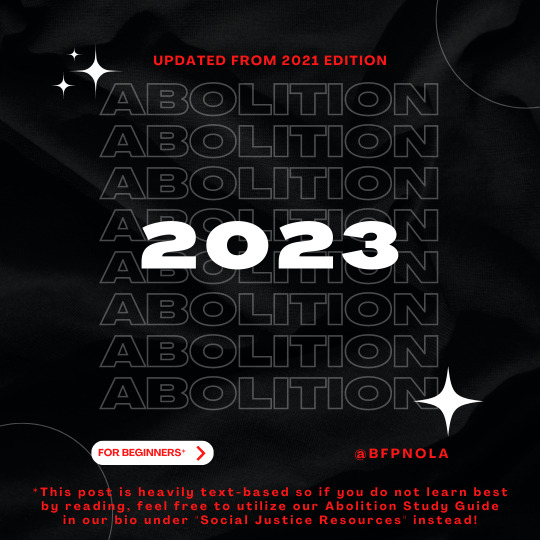
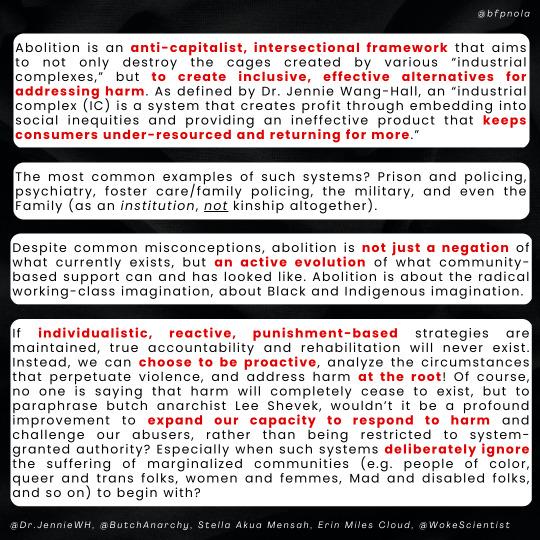

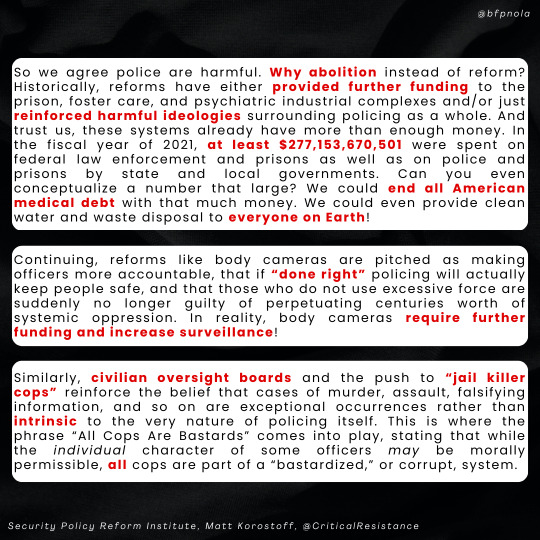
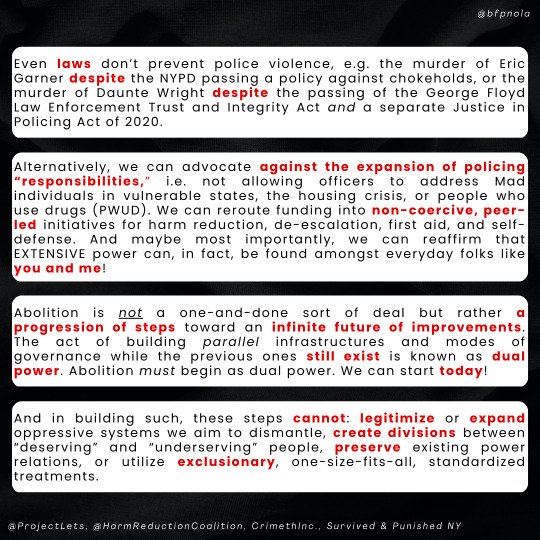
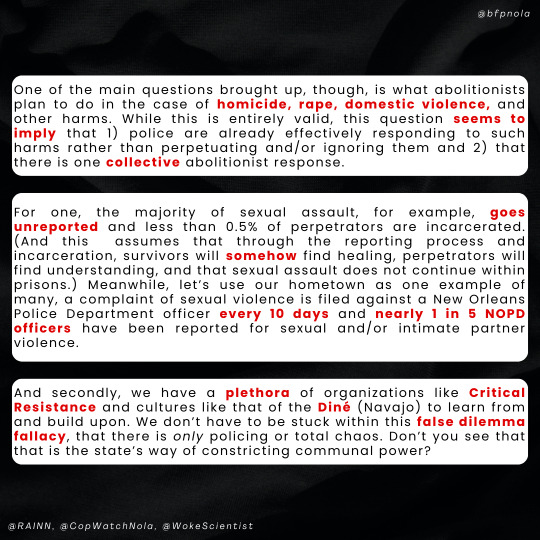

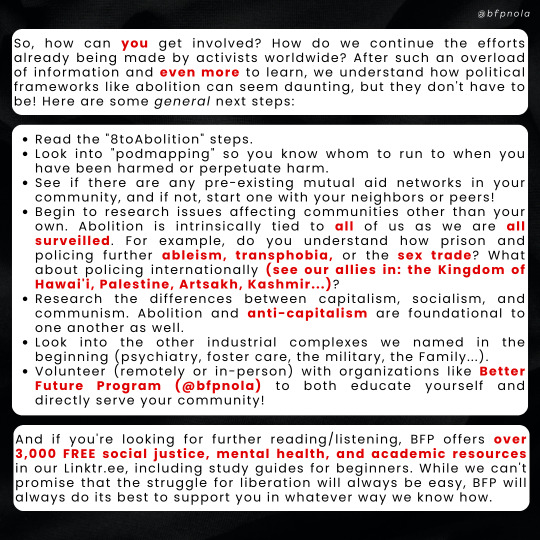
Better Future Program's Linktr.ee | Donate | Liberation Library | Open Leadership Positions | Staff Application | Discord Server
Image description below. Written by @reaux07. Proofread by the volunteers and supporters of @bfpnola.
Image Description:
[ID: All of the following slides use a wrinkled, black fabric as their background with black text (bolded red added for emphasis) on top of white boxes with rounded corners. “@bfpnola” is written in the top right corner and the sources for the slide are in the bottom left corner.
Title Slide (No. 1):
Written in red text, “UPDATED FROM 2021 EDITION.” The outlines of the word “ABOLITION” is written line by line 8 times in light grey with the year “2023” written on top in bold, white lettering. Below, written in red within a white bubble and red arrow, it reads “FOR BEGINNERS*.” Across from the bubble, “@BFPNOLA” is in red. Below, in red again, the asterisk mentioned before leads to the following note: “This post is heavily text-based so if you do not learn best by reading, feel free to utilize our Abolition Study Guide in our bio under "Social Justice Resources" instead!” Lastly, white stars and outlines of grey circles can be seen in each corner of the slide.
Slide No. 2 reads:
Abolition is an anti-capitalist, intersectional framework that aims to not only destroy the cages created by various “industrial complexes,” but to create inclusive, effective alternatives for addressing harm. As defined by Dr. Jennie Wang-Hall, an “industrial complex (IC) is a system that creates profit through embedding into social inequities and providing an ineffective product that keeps consumers under-resourced and returning for more.”
The most common examples of such systems? Prison and policing, psychiatry, foster care/family policing, the military, and even the Family (as an institution, not kinship altogether).
Despite common misconceptions, abolition is not just a negation of what currently exists, but an active evolution of what community-based support can and has looked like. Abolition is about the radical working-class imagination, about Black and Indigenous imagination.
If individualistic, reactive, punishment-based strategies are maintained, true accountability and rehabilitation will never exist. Instead, we can choose to be proactive, analyze the circumstances that perpetuate violence, and address harm at the root! Of course, no one is saying that harm will completely cease to exist, but to paraphrase butch anarchist Lee Shevek, wouldn’t it be a profound improvement to expand our capacity to respond to harm and challenge our abusers, rather than being restricted to system-granted authority? Especially when such systems deliberately ignore the suffering of marginalized communities (e.g. people of color, queer and trans folks, women and femmes, Mad and disabled folks, and so on) to begin with?
Sources: @Dr.JennieWH, @ButchAnarchy, Stella Akua Mensah, Erin Miles Cloud, @WokeScientist
Slide No. 3 reads:
Before we continue any further, let’s destroy the myth that cops actually stop violence. First off, we can’t depend on crime stats at face value because this begs the question of who exactly gets to define what counts as a “crime” and why (e.g. drug possession and sleeping in public vs. tax evasion of the wealthy and wage theft). Continuing, crime rates often only reflect violations that have actually been reported, chosen to be shown, and deemed out of line. By this logic, crime rates are simply reflections of cops’ perceptions, not of the material and emotional realities of the proletariat (i.e. the working-class).
As for perpetuating violence, “US law enforcement killed at least 1,183 people in 2022, making it the deadliest year on record for police violence.” (And those are just the deaths that were reported. In our home state of Louisiana, turns out the Jefferson Parish Sheriff’s Office, as of January 12, 2023, has been unlawfully destroying records of officer misconduct for at least 10 years.) Many (69%) of these murders were cases in which no offense was alleged, were mental health or welfare checks, or involved traffic violations and other nonviolent offenses.
This is, of course, without even touching on the involuntary servitude (i.e. enslavement) and maltreatment ongoing in American prisons. How many more deaths must occur before the general public says enough is enough? Or is this acceptable since these are working-class, disabled, Mad, non-white, queer, and trans lives being lost?
Sources: @InterruptCrim, The Guardian, Mapping Police Violence, @VeriteNewsNola
Slide No. 4 reads:
So we agree police are harmful. Why abolition instead of reform? Historically, reforms have either provided further funding to the prison, foster care, and psychiatric industrial complexes and/or just reinforced harmful ideologies surrounding policing as a whole. And trust us, these systems already have more than enough money. In the fiscal year of 2021, at least $277,153,670,501 were spent on federal law enforcement and prisons as well as on police and prisons by state and local governments. Can you even conceptualize a number that large? We could end all American medical debt with that much money. We could even provide clean water and waste disposal to everyone on Earth!
Continuing, reforms like body cameras are pitched as making officers more accountable, that if “done right” policing will actually keep people safe, and that those who do not use excessive force are suddenly no longer guilty of perpetuating centuries worth of systemic oppression. In reality, body cameras require further funding and increase surveillance!
Similarly, civilian oversight boards and the push to “jail killer cops” reinforce the belief that cases of murder, assault, falsifying information, and so on are exceptional occurrences rather than intrinsic to the very nature of policing itself. This is where the phrase “All Cops Are Bastards” comes into play, stating that while the individual character of some officers may be morally permissible, all cops are part of a “bastardized,” or corrupt, system.
Sources: Security Policy Reform Institute, Matt Korostoff, @CriticalResistance
Slide No. 5 reads:
Even laws don’t prevent police violence, e.g. the murder of Eric Garner despite the NYPD passing a policy against chokeholds, or the murder of Daunte Wright despite the passing of the George Floyd Law Enforcement Trust and Integrity Act and a separate Justice in Policing Act of 2020.
Alternatively, we can advocate against the expansion of policing “responsibilities,” i.e. not allowing officers to address Mad individuals in vulnerable states, the housing crisis, or people who use drugs (PWUD). We can reroute funding into non-coercive, peer-led initiatives for harm reduction, de-escalation, first aid, and self-defense. And maybe most importantly, we can reaffirm that EXTENSIVE power can, in fact, be found amongst everyday folks like you and me!
Abolition is not a one-and-done sort of deal but rather a progression of steps toward an infinite future of improvements. The act of building parallel infrastructures and modes of governance while the previous ones still exist is known as dual power. Abolition must begin as dual power. We can start today!
And in building such, these steps cannot: legitimize or expand oppressive systems we aim to dismantle, create divisions between “deserving” and “underserving” people, preserve existing power relations, or utilize exclusionary, one-size-fits-all, standardized treatments.
Sources: @ProjectLets, @HarmReductionCoalition, CrimethInc., Survived & Punished NY
Slide No. 6 reads:
One of the main questions brought up, though, is what abolitionists plan to do in the case of homicide, rape, domestic violence, and other harms. While this is entirely valid, this question seems to imply that 1) police are already effectively responding to such harms rather than perpetuating and/or ignoring them and 2) that there is one collective abolitionist response.
For one, the majority of sexual assault, for example, goes unreported and less than 0.5% of perpetrators are incarcerated. (And this assumes that through the reporting process and incarceration, survivors will somehow find healing, perpetrators will find understanding, and that sexual assault does not continue within prisons.) Meanwhile, let’s use our hometown as one example of many, a complaint of sexual violence is filed against a New Orleans Police Department officer every 10 days and nearly 1 in 5 NOPD officers have been reported for sexual and/or intimate partner violence.
And secondly, we have a plethora of organizations like Critical Resistance and cultures like that of the Diné (Navajo) to learn from and build upon. We don’t have to be stuck within this false dilemma fallacy, that there is only policing or total chaos. Don’t you see that that is the state’s way of constricting communal power?
Sources: @RAINN, @CopWatchNola, @WokeScientist
Slide No. 7 reads:
To expand this conversation, abolition heavily aligns with the political ideal of “anarchism.” Anarchism supports the absence of government and absolute freedom of the individual. And despite its negative connotations, anarchy also reflects an evolution of community-based care rather than just a deconstruction of what currently exists.
A simplified version of its 6 agreed-upon principles are:
Autonomy and Horizontality: define yourself on your own terms, we stand on an equal footing
Mutual Aid: bonds of solidarity form a stronger social glue than fear, support your community
Voluntary Association: associate or don't associate with whomever you wish
Direct Action: accomplish goals directly rather than depending on representatives or authorities
Revolution: overthrow those in power who enforce coercive hierarchies (ex. white supremacy)
Self-Liberation: you must be at the forefront of your own liberation, freedom must be taken
While being an abolitionist does not require alignment with anarchism, it is worth considering how the state plays such an enduring role in various social harms. Concurrently, whenever you treat other living beings with consideration and respect, come to reasonable compromise rather than coercion, and decide to share or delegate tasks, you are already living by anarchist principles.
Sources: Peter Gelderloos, David Graeber
Slide No. 8 reads:
So, how can you get involved? How do we continue the efforts already being made by activists worldwide? After such an overload of information and even more to learn, we understand how political frameworks like abolition can seem daunting, but they don't have to be! Here are some general next steps:
Read the "8toAbolition" steps.
Look into "podmapping" so you know whom to run to when you have been harmed or perpetuate harm.
See if there are any pre-existing mutual aid networks in your community, and if not, start one with your neighbors or peers!
Begin to research issues affecting communities other than your own. Abolition is intrinsically tied to all of us as we are all surveilled. For example, do you understand how prison and policing further ableism, transphobia, or the sex trade? What about policing internationally (see our allies in: the Kingdom of Hawai'i, Palestine, Artsakh, Kashmir...)?
Research the differences between capitalism, socialism, and communism. Abolition and anti-capitalism are foundational to one another as well.
Look into the other industrial complexes we named in the beginning (psychiatry, foster care, the military, the Family...).
Volunteer (remotely or in-person) with organizations like Better Future Program (@bfpnola) to both educate yourself and directly serve your community!
And if you're looking for further reading/listening, BFP offers over 3,000 FREE social justice, mental health, and academic resources in our Linktr.ee, including study guides for beginners. While we can't promise that the struggle for liberation will always be easy, BFP will always do its best to support you in whatever way we know how.
End ID.]
#reaux speaks#signal boost#tyre nichols#keenan anderson#cop city#abolition#abolish the police#defund the police#anti capitalism#intersectional feminism#palestine#black lives matter#blm#bipoc#disability justice#queer#trans#mass incarceration#study guide#mad liberation#psychiatry#family#military industrial complex#foster care#ACAB#tw rape mention#indigenous#anarchism#pinned post#BLACK HISTORY MONTH
730 notes
·
View notes
Text

四姐!! she will be goth-ed soon….. beloved
#artists on tumblr#digital illustration#m1nsur0#art study#black myth wukong#fourth spider sister#having her without her lovely makeup feels like a sin…. she will be dolled out soon#was trying to draw wukong b4 my masters starts but every drawing i do of him no matter what visual adaptation looks so BAD#why does he hate me. we are both chinese u monkey don’t hinder me drawing u
46 notes
·
View notes
Text

#crt#critical race theory#holy bible#bible study#bible verse#christian#jesus christ#slavery#black voters matter#black votes matter#black votes#black voters#discrimination#misogynoir#hate crimes#intersectionality#antiblackness#racist#civil rights#vote blue#vote democrat#please vote#voting#election 2024#get out the vote#american politics#us elections#morality#moral code#blm movement
10 notes
·
View notes
Text



via myaling asmr
#the same decaying organic matter as everything else [gifs]#deliver me from being perfect and complete [queue]#scrapbooking#paper#academia#journaling#fashion#clothes#clothing#study#notebooks#cameras#photography#printer#printing#photos#gray#brown#white#black#tan#stim#stim gif
14 notes
·
View notes
Text
HB 999 outlines a system for the Board of Governors to “provide direction to each constituent university on removing from its programs any major or minor in Critical Race Theory, Gender Studies, or Intersectionality.”
...
Should HB 999 be passed, the hiring process would change completely. Faculty would not be involved in the search process as the Board of Trustees would be in charge of the vetting process for the candidates.
...
The bill provides instruction on general education courses and standards that promote civic literacy without mentioning diversity. Brown said that without diverse education, students would not have the experience and knowledge for the workforce.
What is academic freedom? In the American context, it means:
— Faculty and students at public universities are free to investigate, study, and teach without fear of government censorship.
— The state, in the person of elected politicians, administrators, and political appointees, does not determine hiring, evaluation, or curriculum content.
— Faculty determine the curriculum, hire faculty, and evaluate the performance of students and faculty.
Here's a petition to sign.
-faw
#black lives matter#blm#black lives still matter#women's studies#critical race theory#academic freedom
141 notes
·
View notes
Text

#black lives matter#fighting racism#white privilege#antiracist#eliminate racism#emily goldstein#whiteness studies#whiteness
17 notes
·
View notes
Quote
A free society does not ban books.
Nikole Hannah-Jones (author, The 1619 Project; interview, with Stephen Colbert, 27 October 2022)
#1619 project#culture studies#race studies#stephen colbert#black lives matter#blm#nikole hannah jones#banned book week#american slavery#american history#a new origin story#the late show
163 notes
·
View notes
Text
The amount of popular white and non black leftists I've had to block for being antiblack as fuck this week is genuinely ridiculous. It fills me with so much fucking shame and anger as a non black person having to see it be perpetuated over and over again from those within my specific community and outside of it. Like why is it so fucking hard for y'all to give a fuck about Black people as people? Why can you not respect the history and the continued history of Black activism, especially given how much radical action and history is so influenced by it? The answer is quite simple, and no matter how much you'd deny it: you're all fucking racist.
What I find sickeningly ironic too, is that so many of you are perpetuating this shit in Bushnell's name. Who, from what I've seen and read of him, was compelled to educate himself on the US's history of state sanctioned violence after the murder of George Floyd. His friends have said enough as well to indicate (and quite literally said) he had an awareness of his privilege as a white man in larger society, and perhaps more of you should take that lesson from him and from his actions too. This kind of behavior and constant reframing of Black anger and frustration at antiblackness as a "psyop" is disgusting, and the tarnishing of Bushnell's name with the perpetuation of that antiblackness in it is a fucking disgrace. You should all feel fucking ashamed of yourselves, but knowing how so far up your own asses some of you are....
#im genuinely convinced that on top of racism#so many of these people are so insecure about the fact#that all their huffed up 'radicalism' is a fucking shame in the face of Black people's mere life experiences#and it fucking eats at them because i genuinely think so many white leftists#literally just use leftistism as another fucking thing to put themselves on a high horse#its all theory its all talk at the end of the day#Black people know true radicalism in a way they never will because they do not have the privilege of backing away#they dont have the option to ever stop fighting because its a literal matter of survival and not just study!!!!!!#i meant sham but hell shame works too...
15 notes
·
View notes
Text



#motivation#study motivation#get motivated#motivating quotes#motivación#black love#black lives matter#baking#barbie mermaid power#bathroom#avatar the way of water#art history#avatar 2009#ao3#adidas#archaeology#aespa
9 notes
·
View notes
Text

small gerard way study lmao
#art#drawing#fanart#digital art#portrait#digital portrait#gerard way#mcr#mcr fanart#my chemical romance#mcr gerard#welcome to the black parade#2006 mcr was was peak honestly#i was like three there#but that doesn't matter#digital painting#portrait study#14 year old emo me is shaking in her fake doc martens#me drawing mcr fanart? in this economy? shocking.
27 notes
·
View notes
Text
Ok…..…. So, They suddenly turn their ONE conventionally attractive young black character in the show, whose a woman of course, into the “wwwwwiiiiiilllllld~ crazy bitch who can’t control her own emotions and powers.” And for the icing on this cake of what has now become a wildly backhanded attempt to make her sympathetic and show that she even has flaws. In turn, make her randomly and for absolutely no reason, MOLEST a guy using her powers?
*Sigh* you’ve gotta be fucking kidding me. I thought we were finally free of this despicable gruel. I thought perhaps maybe, we learned something? You know? Oh my god
Can we please stop, stop turning mentally ill and angry black feminine characters into villains and criminals for plot or fetish? There are better options! I enjoy watching The Umbrella Academy, I don’t know if anyone caught this or really thought about it but I certainly had to after being subjected to that crap.
What, in the seven shades of FUCK, were they thinking…. 😞 smh.
#the umbrella academy#allison hargreeves#tv tropes#truly despicable#racial bias#black lives matter#real talk#and why we need feminism#social studies#writers and poets#SEND HELP
13 notes
·
View notes
Text
Federal Agency Rejects Developer’s Report That Massive Grain Elevator Won’t Harm Black Heritage Sites
For the second time in six months, a federal agency reprimanded a Louisiana developer for failing to adequately assess the harm that its proposed $400 million agricultural development would cause to neighboring Black communities and historic sites.
In a forceful letter dated Dec. 23, the U.S. Army Corps of Engineers rejected claims by the developer, Greenfield LLC, that its massive grain transfer facility in St. John the Baptist Parish upriver from New Orleans will have “no adverse effects.” The Corps is considering a permit application by Greenfield to build on federally protected waters and has the power to halt the project.
That new report, which the Corps received in November, did not address the agency’s demand that the developer conducts a more complete assessment of how the project could damage historic sites and harm residents of nearby towns, according to the Corps’ December letter.
“The report,” the letter reads, “just doesn’t demonstrate adequate engagement, and that must be rectified.”
A Greenfield spokesperson said our team of respected expert consultants and have done thorough evaluations to consider any and all potential impacts. The statement said Greenfield takes seriously its responsibility to provide regulatory agencies with accurate and complete information consistent with the regulatory requirements.
The Corps’ letter criticizes Greenfield and its contractors for failing to meaningfully consult with people whose lives would be impacted by the dozens of looming grain silos, new rail, truck, and shipping traffic, and pollutants from the facility. It says Greenfield and its consultants have not done enough to account for how the development project might harm communities of color, a requirement under federal environmental justice standards.
“It’s very disappointing that they would continue to double down on the report, that they are still saying there will not be any detrimental effects,” Erin Edwards, who blew the whistle on the earlier report, told ProPublica in a recent interview.
“It’s very disappointing that they would continue to double down on the report, that they are still saying there will not be any detrimental effects,” Erin Edwards, who blew the whistle on the earlier report, told ProPublica in a recent interview. Edwards co-authored the first version of the information when she worked as an architectural historian for Gulf South Research Corporation, the for-profit cultural resources, and archaeological consulting firm hired by another of Greenfield’s consultants to conduct a federally required assessment of historical sites.
Edwards resigned in late 2021 after her report was stripped of every mention of possible harm to communities or cultural properties, including her conclusion that the area surrounding the development should be listed as a historic district because of its connection to histories of slavery. In internal Gulf South emails obtained by ProPublica, a company manager wrote that it would lose its contract for the report — and could lose future work — if it didn't change the findings.
“Gulf South knew all along that the project would harm the historic plantations there, and they knew that it would hurt the area as a whole,” Edwards said. “There’s no way to look at the evidence and not see that it’s going to be detrimental.”
The Greenfield grain facility has been the target of sustained pushback from nearby communities, civil and human rights groups, and historic preservation organizations, as well as from other federal agencies, including the Advisory Council on Historic Preservation, which oversees national preservation policy. The land where the development is planned sits beside the Whitney Plantation Museum, which serves as a memorial to enslaved people in Louisiana. One plot of land down the river is another unusually well preserved plantation designated as a National Historic Landmark.
To read the ProPublica Report, you can find the complete publication by clicking here and going directly to the information by visiting their site.
#black pride#black history#black lives matter#blacklivesmatter#black stories#black life#black history month#black history matters#civil rights#civil rights movement#race and politics#critical race studies#slavery#slave trade#slave owner#naacp#aclu#southern poverty law center#plantation#polution#grainhandling#grain drying#historical sites#communities of color#black families#new orleans#louisianna#historic sites#gulf south#advisory council
77 notes
·
View notes
Photo
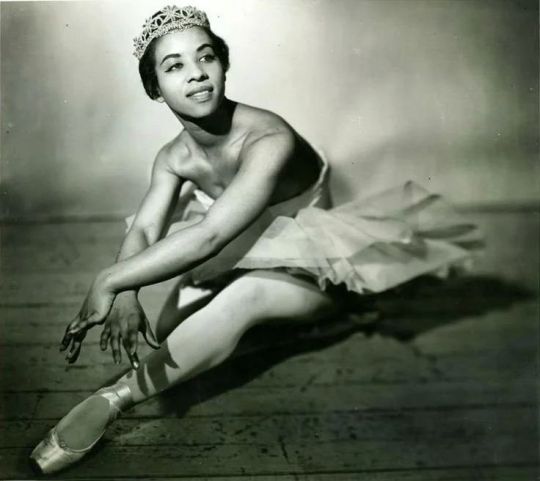
On This Day in New York City History February 2, 1935: Dancer Anne Raven Wilkinson (February 2, 1935 – December 17, 2018) was born in New York City, New York. Wilkinson has the distinction of being the first African-American woman to dance for a major classical ballet company.
Wilkinson was born into a middle class black family in Harlem. Her father was a medical doctor and her mother a ballet dancer. Her love for ballet was born from watching a performance of the Ballet Russe de Monte Carlo, a dance group that she would make history with.
Wilkinson would face difficulties in getting accepted to the Ballet Russe de Monter Carlo. Twice she was rejected before she was accepted at the age of 20 in 1955 by the director of the Ballet Russe de Monte Carlo, Serge Denham.
After leaving the group in the early 1960, Wilkinson would dance with a number row groups before retiring in 1974. That would be a short lived retirement. In the same year Wilkinson would join the New York City Opera and dance for them until 1985. In her later years she would serve as mentor to Misty Copeland who was a trailblazer in her own right. Copeland was the first African American to become a principal dancer at the American Ballet Theatre.
Wilkinson passed away on December 17, 2018 at the age of 83.
#AnneRavenWilkinson #BalletRusseDeMonteCarlo #AfricanAmericanHistory #AfricanAmericanStudies #BlackHistory #BlackStudies #BlackHistoryMatters #WomensHistory #WomensStudies #HERStory #DanceHistory #NewYorkHistory #NYHistory #NYCHistory #History #Historia #Histoire #Geschichte #HistorySisco
https://www.instagram.com/p/CoKa8wxuhZG/?igshid=NGJjMDIxMWI=
#Anne Raven Wilkinson#Ballet Russe de Monte Carlo#African American History#African American Studies#Black History#Black Studies#Black History Matters#Women's History#Women's Studies#HERstory#Dance History#New York History#NY History#NYC history#History#Historia#Histoire#Geschichte#HistorySisco
48 notes
·
View notes
Text
The Palgrave Handbook of African Colonial and Postcolonial History

The Palgrave Handbook of African Colonial and Postcolonial History
This wide-ranging volume presents the most complete appraisal of modern African history to date. It assembles dozens of new and established scholars to tackle the questions and subjects that define the field, ranging from the economy, the two world wars, nationalism, decolonization, and postcolonial politics to religion, development, sexuality, and the African youth experience.
Contributors are drawn from numerous fields in African studies, including art, music, literature, education, and anthropology.
The themes they cover illustrate the depth of modern African history and the diversity and originality of lenses available for examining it. Older themes in the field have been treated to an engaging re-assessment, while new and emerging themes are situated as the book’s core strength. The result is a comprehensive, vital picture of where the field of modern African history stands today.
#The Palgrave Handbook of African Colonial and Postcolonial History#Africa#African history#colonial history#post colonial african history#African studies#Pan African#Black History Matters#Black History#Black LIves Matter#THE BLACK TRUEBRARY#FREE BOOKS#DOWNLOAD BOOKS FREE
5 notes
·
View notes
Video
youtube
Slavery, Freedom, Resistance | US History to 1865 | Study Hall
Depending on who you are or where you are in the world, "freedom" can mean many different things. From the ability to choose your education to moving around freely, many of the things we take for granted, did not exist for everyone back in the 19th Century. In this episode, Dr. Danielle Bainbridge discusses slavery and the people who lived within this system, how they reacted, resisted, survived and died within it.
#youtube#Slavery Freedom Resistance | US History to 1865 | Study Hall#Black Lives Matter#american history
2 notes
·
View notes